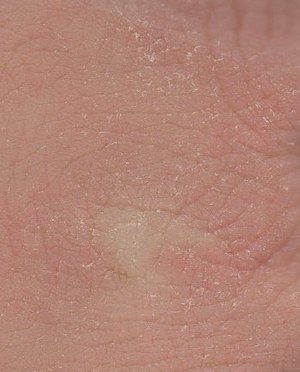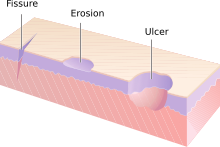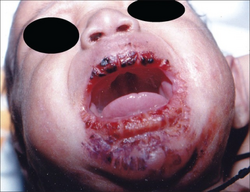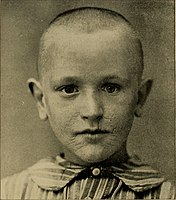Skin fissure
| Skin fissure | |
|---|---|
 | |
| Generalized skin fissuring | |
| Specialty | Dermatology |
A skin fissure, also known as rhagades,[1] is a linear-like crack in the skin.[2][3] It can also affect the tongue and lips, and can become infected, resulting in pain, ulcers and swelling.[3] There may be one or many.[4]
It arises when skin dries, thickens and loses elasticity.[5]
Definition and types

A skin area on which there are many skin fissures is called 'cracked skin', and is most commonly a result of skin dryness. Ichthyosis is a genetic disorder where there is often severe skin cracking. If many tiny fissures occur, it is sometimes referred to as 'chapping'.[4]
Rhagades is a term derived from a greek word meaning tear and is the plural of rhagas.[6] It refers particularly to fissures that radiate out from around the mouth and anus.[6] They have been described in congenital syphilis.[7] A solitary one at the anus may be an anal fissure.[8] Angular cheilitis typically has many.[1]
Other images
-
Angular cheilitis
-
Congenital syphilis
-
Rhagades (1895))
See also
References
- ↑ 1.0 1.1 Federico, Justin R.; Basehore, Brandon M.; Zito, Patrick M. (2023). "Angular Chelitis". StatPearls. StatPearls Publishing. Archived from the original on 2022-10-06. Retrieved 2023-05-12.
- ↑ "Skin fissure". www.ncbi.nlm.nih.gov. National library of medicine. Archived from the original on 23 January 2023. Retrieved 12 May 2023.
- ↑ 3.0 3.1 Langlais, Robert P.; Miller, Craig S.; Gehrig, Jill S. (2017). "18. Diagnostic and descritive terminology: macule, patch, erosion, ulcer". Color Atlas of Common Oral Diseases, Enhanced Edition (5th ed.). Burlington: Jones & Bartlett Learning. p. 18. ISBN 978-1-284-24098-6. Archived from the original on 2022-04-17. Retrieved 2022-04-17.
- ↑ 4.0 4.1 James, William D.; Elston, Dirk; Treat, James R.; Rosenbach, Misha A.; Neuhaus, Isaac (2020). "2. Cutaneous signs and diagnosis". Andrews' Diseases of the Skin: Clinical Dermatology (13th ed.). Edinburgh: Elsevier. p. 13. ISBN 978-0-323-54753-6. Archived from the original on 2022-04-20. Retrieved 2022-04-17.
- ↑ Bolognia, Jean L.; Schaffer, Julie V.; Duncan, Karynne O.; Ko, Christine (2022). "1. Basics". Dermatology Essentials (2nd ed.). Elsevier. p. 9. ISBN 978-0-323-70971-2. Archived from the original on 2024-02-12. Retrieved 2024-02-12.
- ↑ 6.0 6.1 Strakosh, Ernest A.; Nelson, Lawrence M. (1 April 1941). "Postrhagic scars". Archives of Dermatology and Syphilology. 43 (4): 664–671. doi:10.1001/archderm.1941.01490220060008. ISSN 0096-6029. Archived from the original on 2 July 2023. Retrieved 12 May 2023.
- ↑ Ghosh, S; Jain, VK (September 2013). ""Pseudo" Nomenclature in Dermatology: What's in a Name?". Indian journal of dermatology. 58 (5): 369–76. doi:10.4103/0019-5154.117305. PMID 24082182. Archived from the original on 2023-07-02. Retrieved 2023-05-12.
- ↑ Wienert, Volker; Raulf, Franz; Mlitz, Horst (2017). "8. Diagnostics and differential diagnostics". Anal Fissure: Symptoms, Diagnosis and Therapies. Springer. ISBN 978-3-319-49244-5. Archived from the original on 2023-07-02. Retrieved 2023-05-12.


